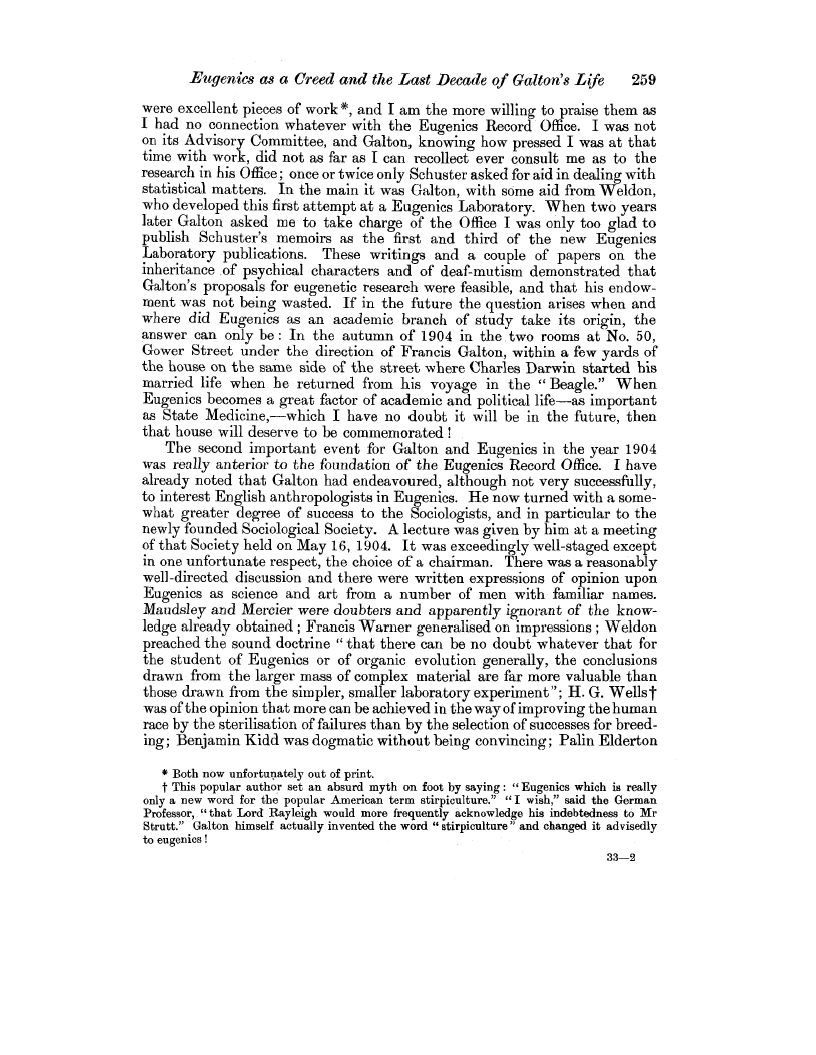| ||||||

OCR Rendition - approximate
Eugenics as a Creed and the Last Decade of Galton's Life 259 were excellent pieces of work*, and I am the more willing to praise them as I had no connection whatever with the Eugenics Record Office. I was not on its Advisory Committee, and Galton, knowing how pressed I was at that time with work, did not as far as I can recollect ever consult me as to the research in his Office; once or twice only Schuster asked for aid in dealing with statistical matters. In the main it was Galton, with some aid from Weldon, who developed this first attempt at a Eugenics Laboratory. When two years later Galton asked me to take charge of the Office I was only too glad to publish Schuster's memoirs as the first and third of the new Eugenics Laboratory publications. These writings and a couple of papers on the inheritance of psychical characters and of deaf-mutism demonstrated that Galton's proposals for eugenetic research were feasible, and that his endowment was not being wasted. If in the future the question arises when and where did Eugenics as an academic branch of study take its origin, the answer can only be : In the autumn of 1904 in the, two rooms at No. 50, Gower Street under the direction of Francis Galton, within a few yards of the house on the same side of the street where Charles Darwin started his married life when be returned from his voyage in the " Beagle." When Eugenics becomes a great factor of academic and political life-as important as State Medicine,-which I have no doubt it will be in the future, then that house will deserve to be commemorated ! The second important event for Galton and Eugenics in the year 1904 was really anterior to the foundation of the Eugenics Record Office. I have already noted that Galton had endeavoured, although not very successfully, to interest English anthropologists in Eugenics. He now turned with a somewhat greater degree of success to the Sociologists, and in particular to the newly founded Sociological Society. A lecture was given by him at a meeting of that Society held on May 16, 1904. It was exceedingly well-staged except in one unfortunate respect, the choice of a chairman. There was a reasonably well-directed discussion and there were written expressions of opinion upon Eugenics as science and art from a number of men with familiar names. Maudsley and Mercier were doubters and apparently ignorant of the knowledge already obtained ; Francis Warner generalised on impressions ; Weldon preached the sound doctrine " that there can be no doubt whatever that for the student of Eugenics or of organic evolution generally, the conclusions drawn from the larger mass of complex material are far more valuable than those drawn from the simpler, smaller laboratory experiment"; H. G. Wellswas of the opinion that more can be achieved in the way of improving the human race by the sterilisation of failures than by the selection of successes for breeding; Benjamin Kidd was dogmatic without being convincing; Palin Elderton * Both now unfortunately out of print. t This popular author set an absurd myth on foot by saying : " Eugenics which is really only a new word for the popular American term stirpiculture." " I wish," said the German Professor, "that Lord Rayleigh would more frequently acknowledge his indebtedness to Mr Strutt." Galton himself actually invented the word "stirpiculture" and changed it advisedly to eugenics ! 33-2
|